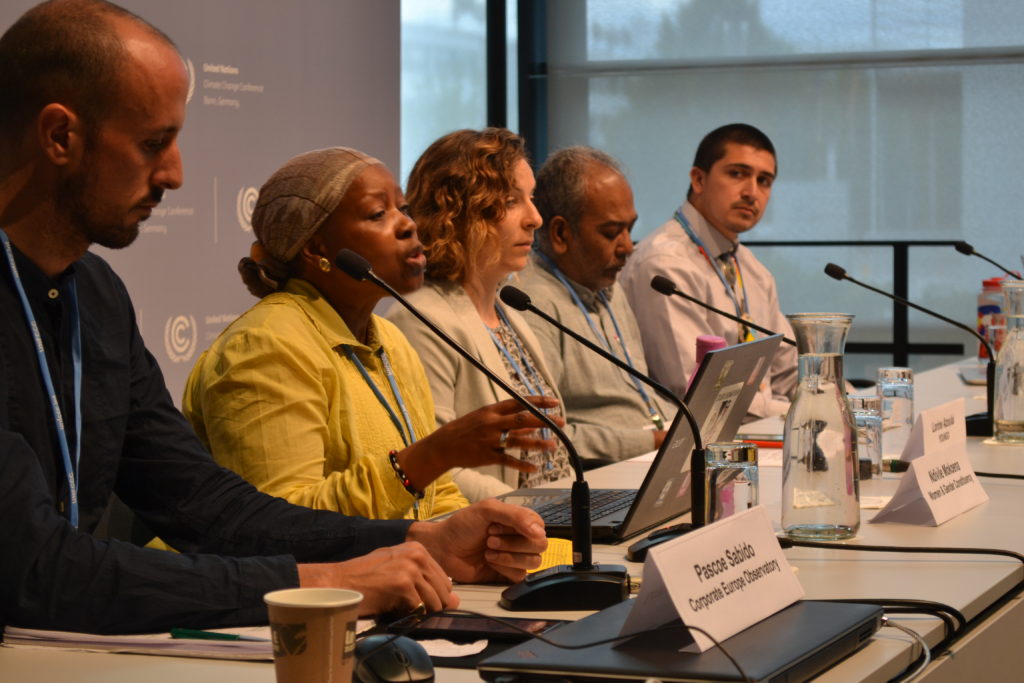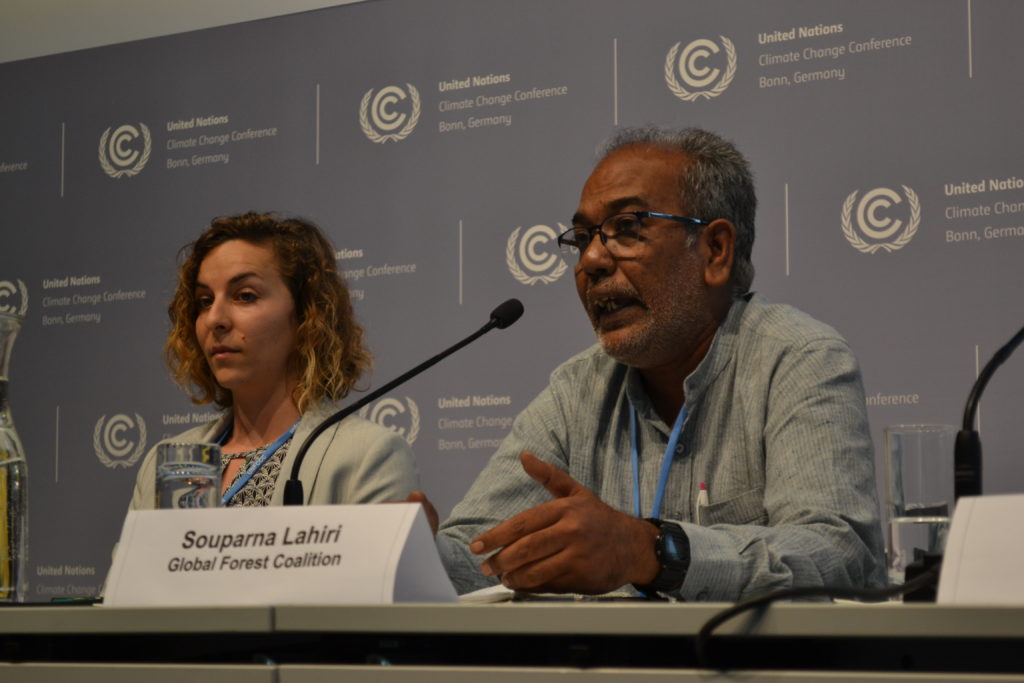
Left to right: Pascoe Sabido, Corporate Europe Observatory, moderates a press conference on Big Polluters and conflicts of interests featuring Ndivile Mokoena representing the Women & Gender constituency; Lorine Azoulai, Youth constituency; Souparna Lahiri, Demand Climate Justice; and Michael Charles, Indigenous Peoples’ Caucus and member of the Navajo Nation.
This blog post is part of “Polluters out, people in!“–our series of dispatches from the global climate talks in Germany. Read more here.
At the global climate talks in Bonn, Big Polluters’ conflicting interests have yet to come up in the sessions where it’s on the agenda. But people from across civil society groups and constituencies are making sure the topic stays front and center.
But first, to understand where things are at, follow us into the weeds for just a brief moment of treaty context: Under the UNFCCC (global climate treaty), there are multiple types of discussion that may be happening at the same time—like trains running on parallel tracks.
The issue of industry conflicts of interest is addressed as part of the agenda of a track called Arrangements for Intergovernmental Meetings (AIM). This is where governments discuss the nitty-gritty of how meetings are run: things like rules and processes for meetings, timing and host countries for major convenings, budgets… and “engagement of non-Party stakeholders”: i.e., who besides governments gets to participate and how.
As you can imagine, there are a number of items on the agenda besides the issue of whether and how Big Polluters should have a seat at the table. So yesterday, in the first meeting of AIM, the topic didn’t come up.
But people across civil society are determined that when this issue comes later this week, the demand is loud and clear. That’s why, today, we and our allies organized a press conference to show government delegates and the media alike that the issue of Big Polluters’ and their proxies’ conflicting interests cuts across many other priority issues for the climate justice movement… and must swiftly be addressed.

Souparna Lahiri of Global Forest Coalition calls to kick Big Polluters out of the U.N. climate talks at this morning’s press conference.
Each of the panelists represented a different constituency with a different focus area within the talks… but all had a common, clear message: It’s time to kick Big Polluters out of the climate talks.
They carried that message into the second session of AIM this afternoon. And although again the topic of industry conflicts of interest didn’t come up for governments, they allocated a portion of the meeting to hearing from civil society groups.
One by one, our allies took the floor: First the Climate Justice Network, then the Indigenous Peoples’ Organization, then the Youth constituency, and finally the Women & Gender constituency. And one by one, they made clear to the governments of the world gathered in the room that—regardless of whatever else is discussed in AIM sessions—kicking Big Polluters out is a big priority.
Michael Charles, a youth leader with SustainUS, is a member of the Navajo Nation. He spoke out forcefully on behalf of the Indigenous Peoples’ Organization, representing the voices of different indigenous communities all over the world.
“Industry representatives were welcomed from the beginning at the UNFCCC while indigenous peoples have always had to fight for our voices to be heard within these halls of negotiation. Therefore, not only are we in support of a conflict-of-interest policy, but also call for the enhanced participation of Indigenous Peoples in climate policy. We reiterate that Indigenous Peoples are self-determining Nations that must be recognized by the UNFCCC as such. Our participation at the table should be prioritized and our indigenous rights should not be lost at the stake of the influence of industry representatives.”
Michael’s words lay bare the real, devastating consequences that Big Polluters’ interference in the talks has — not just on arcane international policy, but for people’s lives all over the globe.
In taking up space at the table to advance their own profit-driven agenda, polluters and their proxies crowd out the voices of communities most impacted by the climate crisis—and the true, just solutions these communities have been bringing forward for years.
Just chaired a v.inspiring press conference – speakers representing youth, indigenous peoples, women and gender and climate justice groups described the devastating impact of corporations on their work, and all called for a #ConflictsOfInterest policy. EU are you listening? pic.twitter.com/8p5GBeq2KG
— Pascoe Sabido (@pascoesabido) June 20, 2019
After today, governments that seek to delay progress on this issue are on notice: Civil society is united, and we expect delegates to address polluters’ and their proxies’ conflicting interests at these negotiations.
We need you to help amplify the demands of these and the many other people and organizations calling to kick Big Polluters out of the climate talks. Take action now to demand Global North governments stop doing polluters’ bidding—and start supporting a conflict-of-interest policy, so that just solutions to the climate crisis can take hold.
This blog post is part of “Polluters out, people in!“–our series of dispatches from the global climate talks in Germany. Read more here.






